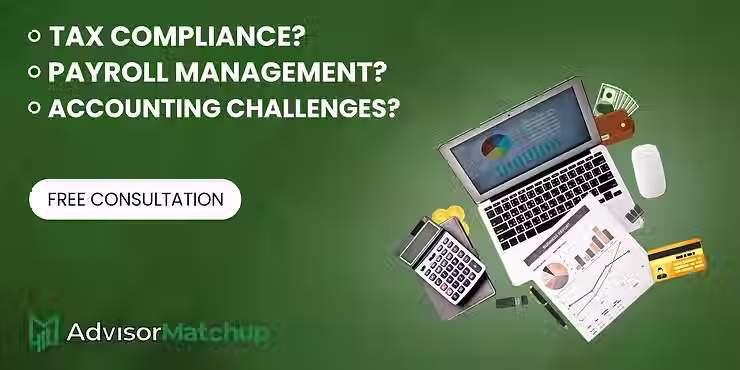What Are the Signs I Need a Business Accountant
- MatchupAccess

- Jun 16
- 6 min read

Running a business involves more than just selling products or services—it also means managing finances, ensuring compliance with tax laws, and making strategic decisions that impact long-term success. For many entrepreneurs and small business owners, the question arises: Do I need a business accountant? The answer depends on your circumstances, but there are several signs that clearly indicate it might be time to bring in a professional.
This article explores those signs in detail to help you determine whether hiring a business accountant is a smart move for your operation.
1. You're Spending Too Much Time on Bookkeeping
Time is one of the most valuable resources for any business owner. If you're finding that a significant portion of your week is consumed by tasks like invoicing, reconciling accounts, and tracking expenses, it's a clear indicator that you could benefit from an accountant.
Bookkeeping and financial management can quickly become overwhelming, especially as your business grows. What starts as a few entries in a spreadsheet can evolve into a complex system of revenue streams, employee payroll, tax deductions, and asset management. An accountant can take this load off your plate, allowing you to focus on your core operations.
2. You're Not Confident in Your Financial Knowledge
Many entrepreneurs excel at their craft but have limited knowledge of accounting principles. If you find yourself unsure about financial terminology, unsure how to read your balance sheet, or confused by your tax obligations, that’s a sign you may need professional help.
A business accountant doesn't just "do the books"; they also act as a financial advisor. They can explain financial reports, help you interpret your cash flow, and guide you in making informed decisions. This not only reduces risk but also improves your confidence as a business leader.
3. Tax Season Is a Nightmare
Tax time is often stressful for business owners, especially if records haven’t been well maintained throughout the year. You might be scrambling to gather receipts, calculate deductions, or figure out which forms to file—and that’s not even taking into account recent changes in tax laws that may affect your business.
An accountant can:
Prepare and file taxes correctly and on time
Identify deductions and credits you may not know about
Help you avoid penalties or audits
Provide year-round tax planning strategies
In short, if tax season fills you with dread, it’s time to call in an expert.
4. You're Planning to Grow Your Business
Growth is exciting, but it brings new financial challenges. Whether you're opening a second location, launching a new product, or scaling your team, you’ll need a solid understanding of how these moves impact your finances.
An accountant can help:
Analyze the financial feasibility of expansion
Forecast future revenue and costs
Secure funding by preparing financial statements for investors or lenders
Optimize operations for efficiency
They can also help you identify red flags before they become major issues, ensuring that your growth is sustainable.
5. Your Business Structure Is Getting More Complex
A sole proprietorship might be manageable without an accountant, but as your business structure becomes more complex—such as forming an LLC, partnership, or corporation—so does your financial management.
Different structures have different tax implications, liability issues, and reporting requirements. An accountant can help you:
Choose the most beneficial structure for your situation
Understand your legal obligations
Ensure you're compliant with local, state, and federal laws
Maintain proper documentation and filings
If your business has multiple revenue streams, operates across states or countries, or is entering into joint ventures, having an accountant is almost essential.
6. You're Getting Audited or Fear Being Audited
The mere thought of an IRS audit can be intimidating. Whether you’ve received notice of an audit or want to prevent one, having an accountant on your side is invaluable.
Accountants can:
Ensure your books are audit-ready
Represent you in dealings with tax authorities
Clarify discrepancies and correct errors
Provide peace of mind that your financials are accurate
Even if you’ve never been audited, sloppy financial records can raise red flags. An accountant helps ensure you remain in good standing with tax agencies.
7. You're Applying for a Loan or Seeking Investors
Lenders and investors want to see a clear, accurate picture of your business’s financial health. If you're applying for a loan or pitching to investors, you’ll need detailed, professional-looking financial statements and forecasts.
Accountants can:
Prepare income statements, balance sheets, and cash flow statements
Help develop business plans with realistic financial projections
Answer questions during due diligence
Improve your credibility in the eyes of financiers
Inconsistent or incomplete financials can easily derail your funding efforts. An accountant ensures your numbers tell the right story.
8. Cash Flow Is Unpredictable or Problematic
Cash flow is the lifeblood of any business. Even profitable companies can face problems if cash isn’t managed properly. If you find yourself frequently short on cash, struggling to pay vendors, or unable to predict your monthly financial position, it’s time to bring in an expert.
Accountants can help:
Analyze your income and expenses
Identify cash flow leaks
Create forecasts and budgets
Suggest operational adjustments to improve liquidity
They can turn your cash flow into a strength rather than a source of stress.
9. You're Falling Behind on Invoicing or Payroll
Delayed invoicing can hurt your cash flow, and payroll errors can lead to unhappy employees or even legal issues. If managing these responsibilities has become a burden—or worse, things are slipping through the cracks—it’s a major red flag.
A business accountant can implement systems or software to automate invoicing, track payments, and ensure payroll is accurate and timely. This not only saves time but also helps maintain professionalism and employee satisfaction.
10. You're Not Sure How Much Your Business Is Really Making
It’s not uncommon for business owners to focus on sales or revenue without knowing their true profit margins. You might be making good money but still feel like you’re always broke. That’s usually a sign that your costs aren’t being tracked correctly—or that you’re misinterpreting your financial data.
An accountant can dig into your numbers to:
Calculate gross and net profit
Break down your costs
Determine your most profitable products or services
Highlight areas where you’re overspending
Understanding your profitability is essential to making smart, data-driven business decisions.

11. You're Considering a Business Sale or Exit
Whether you’re planning to sell, pass the business to a family member, or simply close up shop, an accountant is critical to a smooth transition.
They can help:
Value your business accurately
Prepare the necessary financial documents
Plan for tax implications
Navigate negotiations or due diligence
Trying to handle an exit on your own can leave you vulnerable to legal or financial missteps that could cost you dearly.
12. You're Not Using Accounting Software (or You're Misusing It)
Using spreadsheets or manually tracking expenses might work in the beginning, but as your business grows, accounting software becomes a necessity. However, not all business owners are equipped to use these tools correctly.
A business accountant can:
Help you choose the right software (e.g., QuickBooks, Xero, FreshBooks)
Set it up correctly from the start
Train you or your staff to use it effectively
Troubleshoot issues when they arise
Using software incorrectly can be just as bad—or worse—than not using it at all. An accountant ensures you're getting the full benefit.
13. You Want Strategic Advice, Not Just Number Crunching
Modern accountants aren’t just about balancing books—they’re strategic partners who can help you grow. If you’re looking for insights on how to increase profitability, reduce taxes, improve operations, or plan for the future, an accountant is a valuable resource.
They can provide:
Key performance indicators (KPIs) and benchmarking
Budgeting and financial planning
Cost-benefit analyses
Risk assessments and contingency planning
If you want a roadmap for long-term success, an accountant can help build it.
Final Thoughts
Recognizing the signs that you need a business accountant is crucial to your business's financial health. While hiring an accountant may seem like an additional expense, it’s often a smart investment that can save you money, time, and stress in the long run.
Whether you're just starting out or running a growing company, an accountant can help you stay compliant, make informed decisions, and plan for the future. If any of the signs in this article resonate with your situation, it might be time to take that step and bring a professional into your financial corner.











Comentários